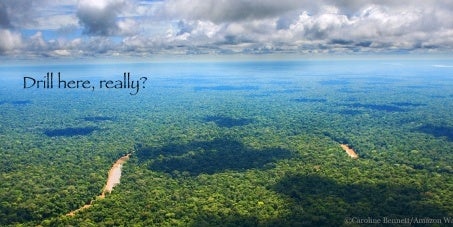Ecuador is a vibrant, bio-diverse country on the West Coast of South America. The country has plenty of oil- in fact, oil is all they have in exporters’ eyes. Since the 1980s, Ecuador has been suffering from what is known as the “Dutch disease”, or the negative impacts a country’s economy may face due to their total economic reliance on one primary good that can be easily affected by a change in demand, a substitution, or its availability. In Ecuador, this primary good is oil.
The INDEV 101 guest speaker this week was Dr. Simron Singh, a social/human ecologist with a focus on the breakdown of local rural systems and their long-term dynamics. He currently teaches sustainability concepts and methods for the MDP program at the University of Waterloo. Dr. Singh spoke about an environmental justice approach to development, which was introduced in today’s class.

In 2008, the government of Ecuador amended its constitution to include Article 77 which entitles nature and the ecosystem to receive legal protection and other fundamental rights that its citizens receive. In 2007, President Correa introduced Ishpingo-Tambococha-Tiputini - an initiative to exchange the preservation of a part of Yasuni National Park from oil extraction for payments from the international community to keep Ecuador’s economy afloat. They requested $3.6 billion, only half of what they would have made from the oil, only to receive $200 million by 2012. The international community did not hold up their end of the initiative, leaving the President with the difficult decision to resort back to oil extraction to keep the economy functioning.

This initiative held good intentions, but lacked proper foresight. Even if the initiative had succeeded, President Correa had no alternative to compensate for the $3.6 billion not asked for from the international community. The donations would have run dry and he would have been forced back to square one anyway. Since Ecuador’s economy continues to be based on oil, this seemingly extra money made each year should be allocated to funding a more sustainable source of primary exports, such as renewable energy, to strive for a more permanent solution to preserving the Amazon.
Many countries aside from Ecuador heavily depend on the extraction of oil, even though oil extraction and production have detrimental effects on humans and the environment. For example, toxic chemicals and pollutants like carbon monoxide and carbon dioxide are released into the air, water, and soil. Environmental degradation, risks to human health, and loss of animal habitat are only a few of the local and global consequences of these actions. In Ecuador specifically, oil hotspots tend to be situated in areas that are difficult to reach (meaning large-scale extraction projects are necessary) or are already settled by Ecuadorian tribes (who are forced to relocate). Oil extraction is obviously not a practice that can be sustained.
Believe it or not, oil extraction is also an issue right here in Canada. Canada’s many exports, such as oil, vehicles, gems, and wood, equated to US$408.7 billion in 2015. This made up for about 25.1% of the country’s total economic output that year. Though Canada has abundant natural resources and a developed system of employment sectors, 19% of our total exports are from oil. This could cause economic barriers should the Trudeau government choose to shift toward greener energy sources.

Contact Information:
Jennifer Jaeger, Jada Wong, Clare Williamson, Brooklyn Lester, Ashley Pestrak
For Further Information:
Yasuni National Park
http://www.yasuninationalpark.org
The Importance of Environmental Action
https://www.youtube.com/watch?v=eRLJscAlk1M
To Make an Impact Yourself
References:
Keyman, A. (2015). Evaluating Ecuador’s Decision to Abandon the Yasuni-Itt Initiative.
Retrieved from https://www.e-ir.info/2015/02/22/evaluating-ecuadors-decision-to->abandon-the-yasuni-itt-initiative/
Singh, S. (2016). Yasunizar and Environmental Justice in the Ecuadorian Amazon.
[Electronic Slideshow].
Workman, D. (2016). Canada’s Top 10 Exports. Retrieved from
https://www.worldstopexports.com/canadas-top-exports/
Photo Credits:
Environment News Service. (2009). Pristine rainforests in Yasuni National Park [Online image]. Retrieved from https://www.flickr.com/photos/joshbousel/4054163191/
Smart Growth Online. (2015). Environmental-justice [Online image]. Retrieved from
http://smartgrowth.org/webinar-addressing-environmental-justice-in-your-community-oct-15/
Soriano, J. (2013). Drillherereally [Online image]. Retrieved from